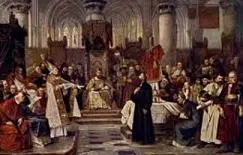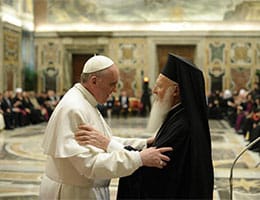 The Greek term schísma , which can be translated as "separation" , came into Latin as schisma . This Latin word, in turn, led to schism in our language . The concept is used in reference to a secession, a rupture , a disagreement or a split .
The Greek term schísma , which can be translated as "separation" , came into Latin as schisma . This Latin word, in turn, led to schism in our language . The concept is used in reference to a secession, a rupture , a disagreement or a split .
For example: "The words of the club president generated a schism within the squad" , "The government has the obligation to avoid schism and to work to achieve the unity of the people" , "The manager's complaint caused a schism within of the company .
The idea of schism is usually used in the context of religion to name the separation of a community of believers into two or more sectors . The Schism of East and West occurred in 1054 and marked the break between the pope (leader of the Roman Catholic Church ) and the ecumenical patriarch of Constantinople (leader of the Orthodox Church ).
This moment in history is also known by the name of the Great Schism , sometimes also attaching the year in which it took place to distinguish it from other events. The two aforementioned leaders, as well as the hierarchs of the Orthodox Church who shared powers with the Ecumenical Patriarch of Constantinople, separated and a mutual excommunication occurred. The disagreement that led to such a fissure included written mockery and questioning the legitimacy of certain appointments, something that seems commonplace in current governments.
If we go back almost five centuries, when the Third Council of Toledo took place in 589, in which the Visigoths converted to Catholicism, the term Filioque was coined, which can be translated as "and of the Son." This caused an alteration in the way the Creed was interpreted, since the Holy Spirit came to proceed from the Father and also from the Son.
Continuing with the background of the Eastern Schism, twenty years before said council the name of the pope had been removed from the diptychs of the Constantinopolitan patriarchate, although even today scholars have not understood the reason for such a decision. One possibility is that the patriarchate had not correctly understood a profession of faith sent by Pope Sergius IV in which the term Filioque was present.
 It is worth mentioning that the insertion of this term in the Latin Creed had already been carried out in various liturgies on the European continent for two centuries, and that later it would occur especially in the Carolingian, but this did not make the Roman one follow the same path. Several hundred years must have passed until the recitation of the Creed included the word Filioque , shortly before the schism: in the year 1014, Henry II asked Pope Benedict VIII to recite this prayer during his coronation as emperor, and it was there that changed everything.
It is worth mentioning that the insertion of this term in the Latin Creed had already been carried out in various liturgies on the European continent for two centuries, and that later it would occur especially in the Carolingian, but this did not make the Roman one follow the same path. Several hundred years must have passed until the recitation of the Creed included the word Filioque , shortly before the schism: in the year 1014, Henry II asked Pope Benedict VIII to recite this prayer during his coronation as emperor, and it was there that changed everything.
The reason the pope agreed to break the tradition of the Roman liturgy , which had been maintained for approximately seven centuries, was his need for the future emperor to provide military support to the Church.
The Western Schism , on the other hand, took place between 1378 and 1417 . In that period, there were different bishops who competed to exercise the pontifical authority of the Catholic Church . The dispute broke out in the conclave of 1378 , which led to the election of Urban VI as pope. The French cardinals, however, did not agree with the conduct of the election and reconvened elsewhere, naming Clement VII as pope. Urban VI and Clement VII , meanwhile, decided to excommunicate each other, leaving Catholics without a clear leader: both proclaimed themselves as God 's representatives on Earth .
